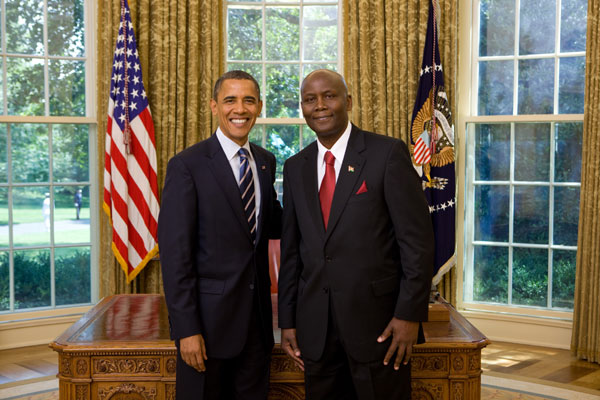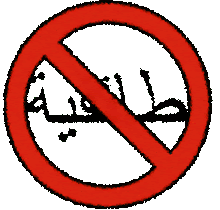
February , 2011 -- Arab popular revolutions to spread south into sub-Saharan Africa
A source with close connections to the U.S. Africa Command (AFRICOM) has told us that the military command, which is responsible for U.S. security in Africa, is expecting the popular rebellions against corrupt dictators to spread south, far into sub-Saharan Africa. In fact, there have already been clashes between pro-democracy protesters against regimes in Sudan, Morocco, Algeria and Djibouti.
Although the initial Facebook-linked youth protests against Sudanese leader Omar Hassan al Bashir mirrored similar early-stage social networking "themed" protests at the outset of the Tunisian and Egyptian uprisings, the protests in Sudan soon grew to include all those who are tired of the corruption and skyrocketing food prices in Sudan --- a recipe for a major uprising in Sudan, which has just seen South Sudan vote to secede from the north.
Encouraged by the protests in Egypt to the north and Yemen to the east, the people of Djibouti are also taking to the streets against their dictator, Ismail Omar Gelleh. However, unlike Bashir in Sudan, Gelleh is a close ally of the United States. Gelleh permits the Pentagon to maintain a large base, which includes a major National Security Agency signals intelligence station, at Camp Lemonier, a former French military base.
However, Djibouti and Sudan are in the Arab League and more prone to the events in Egypt, Jordan, Yemen, and Tunisia. But the mass uprisings are also expected to hit the states of black Africa and AFRICOM stands ready to assist U.S.-backed dictators to put down any rebellions, according to our source...
Ugandan dictator Yoweri Museveni, who is a close friend of US ambassador to the UN Susan Rice, is facing a presidential and parliamentary election on February 18. Museveni has threatened to jail his closest rival, Kizza Besigye.
We have learned that Museveni has brought ethnic Tutsis into Uganda from Rwanda, Democratic Republic of Congo, and Burundi and issued them voting registration cards to vote in constituencies where there is heavy support for the opposition. The Tutsis have also been armed with AK-47s to threaten opposition candidates and their supporters.
In addition, Museveni has transported Ugandan troops from barracks around the country to opposition strongholds to not only cast votes against the opposition but to intimidate and threaten the opposition to Museveni. We have also learned that Ugandan troops are under orders to systematically assassinate opposition leaders, following what is expected to be a fraudulent election, in order to prevent a mass uprising as seen in Tunisia and Egypt.
Museveni is popular with the Pentagon as only he and the leader of Burundi sent peacekeeping troops into Somalia. Uganda also sits on newly-discovered oil deposits and the Pentagon is under orders to protect a planned oil pipeline that is to transport crude from both Uganda and South Sudan to the Kenyan port of Mombasa.
Museveni's planned theft of the election is expected to bring out thousands of protesters across Uganda, possibly triggering an Egyptian and Tunisian situation in the country. But Museveni has received assurance from AFRICOM that the Obama administration will stick by the Ugandan dictator and order U.S. forces to help Museveni put down any large-scale rebellion.
The Obama administration also wants AFRICOM to secure Kenya from political violence that could impact the construction of the trans-Kenyan pipeline planned from Uganda and South Sudan to Mombasa. However, in the case of Kenya, Obama's own ethnic tribal biases and de facto support for Kenya's Luo tribe have resulted in Obama's fellow Luo tribesman, Prime Minister Raila Odinga, challenging President Mwai Kibaki, a member of Kenya's long-dominant Kikuyu tribe, over constitutional issues prior to next year's presidential election. Odinga and Kibaki top a fragile political coalition that was formed after a disputed election in 2007.
Odinga's support comes from the Orange Democratic Movement and "Orange Power" is yet another color-coded George CIA Soros-backed contrivance to stir up problems in Kenya. Ostensibly a leftist, Odinga, whose father Oginga Odinga, was a friend of President Obama's father, Barack Obama, Sr., a fellow Luo, favors dealing with the International Criminal Court and World Bank. Prime Minister Odinga claims to be the first cousin of President Obama, however, the White House studiously avoids downplaying any potential conflicts-of-interest Obama has in inter-tribal Kenyan politics. The trans-Kenyan pipeline is the major issue for Obama's relations with the homeland of his father at the present time.
However, Obama's perceived bias to Odinga and the Orange movement and Odinga's habit of installing fellow Luos in key government positions, including naming his in-law, Elkanah Odembo, as ambassador to Washington, has non-Luo ethnic groups up in arms. Odinga has also appointed his sister, Wenwa Akinyi, as Kenyan Consul General in Los Angeles.
Non-Luos accuse Odinga of practicing nepotism on a grand scale. The opposition is now coalescing around three major ethnic groups, the Kikuyu, Kalenjin and Kamba. Their opposition coalition is called the "KKK Alliance." AFRICOM fears that the KKK could launch an Egypt-style rebellion that would take on bloody inter-tribal warfare aspects, as well as an anti-Obama, and thus, anti-American flavor.

Obama greeting a Kenyan ambassador, a reported Obama relative and in-law of Kenyan Prime Minister Raila Odinga, at the White House. Ambassador Odembo is married to Aoko Midiwo, the sister of Odinga's first cousin. Odinga, whose father Oginga Odinga was a good friend of Obama's father, Barack Obama, Sr. However, popular rebellions against unpopular leaders in sub-Saharan Africa makes Obama's African family ties a liability for American foreign policy. Charges of Odinga's nepotism makes Obama a relative of many officials in the Kenyan government.
Popular, anti-dictator rebellions are also expected in Gabon, where 2009 opposition presidential candidate Andre Mba Obame claims to have won over the son of long-time dictator Omar Bongo, Ali Bongo. Protests against the Gabonese regime broke out in Libreville after the ouster of Tunisian dictator Zine-al Abidine Ben Ali.
Another U.S.-backed dictator who could face an Egyptian-style revolution is Ethiopian dictator Meles Zenawi, who along with Museveni of Uganda and Paul Kagame of Rwanda, is one of Washington's favorite dictators. As with Tunisia and Egypt, the rise in food prices and unpopular austerity measures forced by the international bankers, may be the catalyst that brings out the masses into the streets in capital cities from Damascus to Addis Ababa to Nouakchott and Ouagadougou to Bujumbura. And even with AFRICOM's presence on the continent, the United States is a failing superpower unable to take care of its own people and increasingly lacking the capability to put down "people power" in the ME or Africa.
The Obamabumbler administration, tone deaf on the fall of the "Arab Dictators," seems equally tone deaf about the impending fall of the "African Dictators."









